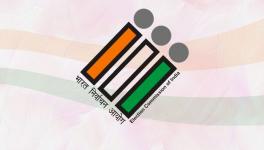A Case of People Versus Cynical Politics

Representational image. | Image Courtesy: Washington Post
Three completely different things. One is a virus, the other is a pest, and the third is a religious congregation. How on earth could there be a connection between them? But tragically, there is. The connecting thread is hate, more dangerous than any virus we have known or are likely to know. Hate is, to update William Shakespeare, that “green-eyed monster which doth mock the meat it feeds on”. The more we hate others, the more our hate-fueled inferiority complex mocks us.
The whole world is now under the grip of the Coronavirus whose destructive potential is incalculable. We have seen two World Wars, many earthquakes, floods and wildfires, a Tsunami, even the Great Plague of London (1665-66) and the Spanish Flu (1918-20), but never have we seen such massive destabilisation across all continents. By the time this column is out, the situation will probably be starker. There is little doubt that a vaccine will be found soon. But what will happen to the virus of hatred that is being nurtured on a daily basis in the name of spotting the original culprit? It is man’s misfortune that he thinks that all his misery is because of someone else’s fault. Just like for Trump’s America it is the “Wuhan Virus”, for many Hindus it is because of the Muslims, through their agents like the Tablighi Jamaat.
Pandemics are not new. To put it wryly, they can be seen as the harbingers of globalisation. In the 14th century, the bubonic plague spread across China, Central Asia, India and the Middle East. In 1347, traders from Genoa and Venice passed it on to Mediterranean ports. Yellow fever and the hookworm reached America through the importation of slaves from Africa. In the early 19th century, cholera migrated from India to Sri Lanka, Afghanistan and Nepal. It then reached the Arabian Peninsula, from where it spread to East Africa, Burma, China, Japan, Java, Poland, Russia, Thailand and Turkey. The Austro-Hungarian Empire, Germany, Poland and Sweden were next, before it ultimately arrived in the British Isles, Canada, and the United States.
According to Jared Diamond, the author of Guns, Germs and Steel: The Fates of Human Societies (1997), “Small pox, measles, influenza, typhus, bubonic plague, and other infectious diseases endemic in Europe played a decisive role in European conquests, by decimating many peoples on other continents. For example, a smallpox epidemic devastated the Aztecs after the failure of the first Spanish attack in 1520.” There is also the famous story of smallpox-infected blankets gifted by British colonists to exterminate some specific Indian tribes in North America. During recent centuries, when the United States experienced massive immigration flows, fears were expressed that the immigrants were prone to import their native diseases.
It is against this background that our concern about the Corona virus must be seen. Until recently, Indians were made to believe that a major threat to their survival emanated only from the “termites” that had infested every nook of India. The then BJP president and presently India’s Home Minister, Amit Shah, referred to these “termites”, the unauthorised Bangladeshi settlers in India, in his election speeches to garner Hindu votes. During the three-week lockdown of India when millions of poor Indians hit the roads to desperately reach their native villages to avoid starvation, I eagerly tried to spot these “termites” among the fleeing poor. But no TV or social media footage obliged me. That Amit Shah had played his anti-Muslim hate card was evident.
Tragically, the same hate card is once again on display at the mass level. In addition to its anti-Muslim strand, it now has an anti-North Easterner strand as well, because, apparently, many citizens from those parts look “Chinese”. Ever since news of the Tablighi Jamaat meet in Delhi (13-15 March) and its inevitable impact on the spread of the Corona virus has surfaced, a section of the Hindutva brigade has left no stone unturned to accuse Muslims at large for spreading the virus with the ostensible aim of killing Hindus. Vigilante groups are running amok in semi-urban areas asking for IDs from local vendors, just to target Muslims. Many old, out of context, videos are being uploaded on social media to spread all kinds of anti-Muslim venom.
What the Tablighi Jamaat did was idiotic, and the Indian state should have been watchful and prevented it from happening. But such idiocies are rampant across religions. If I start documenting them, this column will run out of space. And if you need to be reminded of how dangerous such fanaticism can turn out to be if it is not contained: In Patiala a Nihang (a member of a firebrand Sikh sect) chopped a police officer’s arm off just because the officer and his team were enforcing a state-mandated lock-down.
Like India’s Muslims, people from India’s Northeast are also being exposed to racial abuse in several parts of India. My former students from the region have been routinely mentioning these humiliations to me. In the present Corona context, I received an e-mail from one of them, Ms Lamneivah Sithou, a Thadou/Kuki from Manipur. With her permission, I am sharing it with my readers. See the anguish in her tone:
“Having lived in Delhi for more than a decade I have seen how we are subjected to racial discrimination as a matter of routine. Now that Corona virus is supposed to have spread from China we are ridiculed on the streets and public places with such abusive comments as, ‘you Corona Virus’, ‘Go Corona Go’, and so on. These racial slurs hit at the core of our dignity as human beings. We are being reduced to insects. India’s idea of ‘Unity in Diversity’ lies in tatters.”
Then she makes a suggestion: “Let the Indian Parliament make a law against such racial attacks so that all its Indian citizens can live with equal dignity and self-respect.”
Unfortunate girl, she still entertains lofty faith in our legislations!
One last point. It is disgusting to see how politicians around the world take their citizens for a ride in the name of religion. In India it is now endemic. What will happen to that country where secularism and liberalism become abusive terms? A secular person is abused as siccular, and a liberal as libtard—“liberal bastard”. Even Prime Minister Modi thinks that his electoral victory indicated the end of secularism. Alas, how can one convince these people that secularism is an ideal, like honesty, truthfulness, etc.? One can criticise somebody as not sufficiently secular, but to discard secularism altogether as an idea amounts to throwing the baby out along with the bath water.
Unfortunately the trend is not confined to India. Even the United States, which gave the world its first written constitution almost 250 years ago, and talked of separating the state from religion, is drifting away from its ideal. President Trump routinely plays to his Christian gallery. After having totally failed to tackle the Corona threat, he had the audacity to boast on 24 March, the day India began a three-week lockdown, that by Easter Sunday, that is 12 April, the Corona problem would be solved and “you’ll have packed churches all over our country”. Ironically, by that same Easter Sunday, America had recorded as many as 561,103 confirmed Corona cases and 22,106 deaths. Ideally, instead of “packed churches” Trump should have promised “packed offices and factories”. According to the economist Arun Kumar, in these three weeks, 16 million Americans have lost their jobs, which is more than what was lost in the entire financial crisis of 2007-09.
No one will dispute that religion is important in one’s life. But one’s religiosity has no business to intrude into another person’s religiosity. Let me take my own example. I am a Hindu, but I am secular as well. Where is the contradiction? Do I not respect all other religionists as equal in every sense? Sonia Sikka, a West-based philosophy professor, makes sense to me when she argues that seldom do all members of a community blindly follow their religious tradition. In most cases, they are spiritual but not religious, because their inner voices serve them as “critical insiders”. Those voices make them reflective and make them “adopt the views and practices that cohere with their own experience and judgment”. And that judgment, I think, should not be anything but humanist.
Postscript: In any grim situation there is always a silver lining. When colonists encountered tropical diseases and realized that the germs did not distinguish between them, the colonial masters, and their servants, they spent enormous time and resources to understand these diseases and locate cures. The result was that in due course the world had the legendary Institute for Tropical Medicine in London and the Royal Tropical Institute in Amsterdam. Who knows, but it might be possible that at the end of the Corona menace we will have some unthinkable breakthroughs in our medical knowledge. And societally also, we will know that there is a world of mutual trust and respect beyond the presently divisive religion-centric, race-centric, and power-centric polities. The best democracies of the West, which are held up as models today, had only until a few hundred years ago a gory history of religious conflicts. Human ingenuity is inexhaustible.
As the poet Sahir Ludhianvi wrote, the gloomier the night, the brighter the sunshine. Let us be led by humanistic thinkers, not self-serving politicians.
The author is senior fellow, Institute of Social Sciences, New Delhi and formerly professor of South Asian Studies at JNU. The views are personal.
Get the latest reports & analysis with people's perspective on Protests, movements & deep analytical videos, discussions of the current affairs in your Telegram app. Subscribe to NewsClick's Telegram channel & get Real-Time updates on stories, as they get published on our website.
























